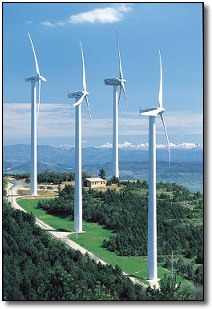
Image: EHN
 |
EHN wind
turbines (some pictured here) could soon be devoted to producing
hydrogen. Image: EHN |
"...renewable energy sources will become the most important source
for the production of hydrogen."
- High Level Group for Hydrogen and Fuel Cells
| Navarre, Spain -
August 20, 2004 [SolarAccess.com] Behind the push toward a future
hydrogen economy are many important debates -- perhaps most important of
all is where the hydrogen will be obtained. So far, many hydrogen/fuel
cell projects rely on hydrogen sourced through fossil fuels. Critics and
experts alike argue hydrogen should eventually be derived from clean,
renewable fuels. And that's at the heart of new research being conducted
by Corporacion Energia Hidroelectrica de Navarra (EHN). The company has
begun a research project with the Universidad Publica de Navarra (UPNA)
with the aim of obtaining hydrogen from water through electricity
generated from wind power. This experiment represents one of EHN's first step toward the clean and competitive production of a fuel that is destined to play a key role in the future sustainable energy model. The project consists of simulating the electric power generation conditions of a wind farm in a laboratory and analysing the effects in an electrolyser, a device that generates hydrogen and oxygen from water through the application of electricity. The data obtained will enable the design of wind turbines and electrolysers specifically designed for the production of hydrogen with maximum efficiency. The initiative comes under the collaboration agreement signed in October 2003 in Hamburg between EHN, Stuart Energy Systems Corporation and Statkraft SF (the largest electricity company in Norway). The projects set out to evaluate, demonstrate and implement energy solutions based on hydrogen generated from renewable energy sources. Location: Universidad Pıblica de Navarra EHN commissioned the project to the Universidad Pıblica de Navarra, on whose premises the installation of the required technical equipment was completed. The equipment includes an electrolyser - supplied by Stuart Energy - with rated power of 5 kW and a production capacity of 1 standard cubic meter of hydrogen per hour. The project also includes a 10 kW electronic converter with current control and microprocessor-supervised operation, developed by the UPNA. This converter will feed the electrolyser with voltage and current similar to the levels produced on a wind farm, under all kinds of operating conditions. The experiment, which will run for several months with a budget of 180,000 euros for its initial phase, will have continuity in later phases. These will cover the use of hydrogen in public transport buses in the city of Pamplona and a wind turbine designed specifically for the production of hydrogen. Zero emissions based on renewable energy sources Hydrogen is not an energy source as such, rather an energy carrier that enables its storage, transport and use. Used through fuel cell technology - which generates electricity from oxygen and hydrogen - hydrogen does not produce polluting emissions nor does it contribute to global warming, because it only emits water vapour in the process of energy conversion. However, the hydrogen obtained from renewable energies can guarantee a product with zero emissions throughout the production cycle on its own. For this reason hydrogen is considered by a number of experts as the ideal 'bridge' to make the transition from fossil fuels - based on coal, oil and gas - to another sustainable model based on the use of clean energies. In this sense, the High Level Group for Hydrogen and Fuel Cells -a committee of experts, companies and other involved agents set up by the European Commission - states in its Final Report (2003) that "electricity and hydrogen together represent one of the most promising ways to achieve [...] an emissions-free future based on sustainable energy" and adds that "renewable energy sources will become the most important source for the production of hydrogen". |
|
|
| For
Further Information: EHN |
Please Note: SolarAccess.com and Arizonaenergy.org do not endorse the sites behind these links. We offer them for your additional research. Following these links will open a new browser window.
Copyright © 1999 - 2004 - SolarAccess.com
Please visit www.solaraccess.com for great coverage on energy today!!